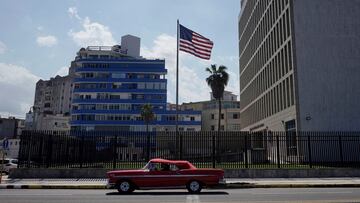What is ‘Havana Syndrome’, what are its symptoms and why is it related to Russia?
Fresh evidence has emerged linked Russia to attacks on U.S. officials in Vietnam ahead of Vice President Kamala Harris visit.

Between 2016 and 2017, a curious illness started cropping up in employees in the US embassy in Havana. Symptoms included dizziness, loss of balance, hearing loss, anxiety and something they described as “cognitive fog”, and it was affecting staff at the embassy as well as their families. It picked up the name ‘Havana Syndrome’ with possible explanations including everything from mosquito fumigation to noisy crickets.
It was thought by some outsiders at the time that mass hysteria could be responsible, but doctors at the University of Pennsylvania who evaluated the patients through advanced brain imaging found differences between them, including less white matter and connectivity in the areas that control vision and hearing than similar healthy people.
The US was quick to blame Cuba and Russia accusing them of carrying out “sonic attacks”, which Cuba strongly denied. Canada made cuts to embassy employees in Cuba after 14 cases were reported there as well.
And it wasn’t just in Cuba, related symptoms also arose in staff working in China, leading to staff cuts there too. Back in 2018 US officials working in Guangzhou had been reporting “subtle and vague, but abnormal, sensations of sound and pressure”. One US official was diagnosed with mild brain trauma, according to a BBC report.
Exclusive: The mysterious neurological symptoms experienced by American diplomats and spies in Cuba and China--dubbed Havana Syndrome--are consistent with the effects of directed microwave energy, according to a long-awaited report by the National Academies of Sciences.
— Ken Dilanian (@KenDilanianNBC) December 5, 2020
Kamala visit reignites Russia’s Havana Syndrome threat
Now fresh reports have emerged on U.S. officials being injured in a Havana Syndrome-style attack in Vietnam prior to Vice President Kamala Harris’s 2021 visit.
New evidence suggests Russia’s involvement, possibly through providing technology to Vietnam that caused the injuries. An investigation by 60 Minutes, in collaboration with investigative journalist Christo Grozev, uncovered a document indicating Russian intelligence’s authorisation to provide exclusive technology to Vietnamese security services, including LRAD acoustic emitters potentially capable of causing harm.
Eleven U.S. officials were injured in a Havana Syndrome-style attack ahead of VP Kamala Harris's 2021 trip to Hanoi. A newly discovered document suggests Russia may have been involved. https://t.co/ivEQTcvTrh pic.twitter.com/BaYqKfAzcd
— 60 Minutes (@60Minutes) April 1, 2024
Retired Army Lieutenant Colonel Greg Edgreen, who led a Defense Intelligence Agency investigation, believes Russia aimed to disrupt U.S. diplomatic efforts, akin to previous incidents in Cuba. However, proving Russia’s involvement faces high hurdles, raising concerns over diplomatic implications and potential repercussions.
What is Havana Syndrome?
An earlier study by the U.S. body the National Academies of Sciences found that many had suffered longstanding and debilitating effects. It posited that the cause of the strange illness could have been “pulsed radio frequency.”
“The committee felt that many of the distinctive and acute signs, symptoms and observations reported by [government] employees are consistent with the effects of directed, pulsed radio frequency energy,” the report said. “Studies published in the open literature more than a half-century ago and over the subsequent decades by Western and Soviet sources provide circumstantial support for this possible mechanism.”
Despite being called Havana Syndrome –the mysterious health incidents first publicly appeared in Cuba in 2016 – 60 Minutes found at least four Americans reported being hit two years earlier in Frankfurt, Germany. https://t.co/dXDYM4dmpm pic.twitter.com/mjGtxQVhux
— 60 Minutes (@60Minutes) April 1, 2024
Related stories
It went on to explain that while psychological and social factors could be partly responsible for the syndrome, those could not account for “the acute initial, sudden-onset, distinctive, and unusual symptoms.”
While important questions remain, the report continued “the mere consideration of such a scenario raises grave concerns about a world with disinhibited malevolent actors and new tools for causing harm to others, as if the US government does not have its hands full already with naturally occurring threats.” And this was before Russia invaded Ukraine.


Complete your personal details to comment